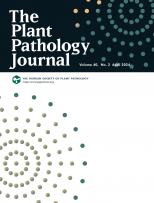As an open access journal, Plant Pathology Journal (PPJ) will follow the Principles of Transparency and Best Practice in Scholarly Publishing (https://doaj.org/bestpractice) developed by Committee on Publication Ethics (COPE), the Directory of Open Access Journals (DOAJ), the Open Access Scholarly Publishers Association (OASPA), and the World Association of Medical Editors (WAME).
Table of Contents
- 1. Website
- 2. Name of Journal
- 3. Peer Review Process
- 4. Ownership and Management
- 5-6. Governing Body / Editorial Team and Contact Information
- 7. Copyright and Licensing
- 8. Author Fees
- 9. Process for Identification of and Dealing with Allegations of Research Misconduct
- 10. Publication Ethics
- 11. Publishing Schedule
- 12. Access
- 13. Archiving
- 14. Revenues Sources
- 15. Advertising
- 16. Direct Marketing
1. Website
The URL of official journal web site is https://www.ppjonline.org. The PPJ team endeavors to make a good website. PPJ website demonstrates that care has been taken to ensure high ethical and professional standards. It does not contain any misleading information, including any attempt to mimic another journal/publisher's site.
2. Name of Journal
The official journal title is Plant Pathology Journal, the abbreviation of ISO is Plant Pathol. J.3. Peer Review Process
All manuscripts are considered to be confidential and are reviewed by members of the Editorial Board, or qualified ad hoc reviewers. Each manuscript receives two simultaneous reviews. The review article needs to be pre-submission to the Editor-in-Chief with cover letter that includes “title”, “authorship”, “abstract”, “short comments why this review is timely critical”, and “10 references”. When a manuscript is submitted to the Editor-in-Chief, it is given a manuscript number and is assigned to one of the editors. Each reviewer makes a specific recommendation to the Editor for the manuscript, based on the following aspects that are applicable: importance of the research, originality and novelty of the work, appropriateness of the approach and experimental design, soundness of conclusions and interpretations, relevance of discussion, clarity of presentation, organization of the article, and demonstration of reproducibility. Before reviewing, all submitted manuscripts are inspected by Similarity Check powered by iThenticate (https://www.crossref.org/services/similarity-check/), a plagiarism-screening tool. The corresponding author is notified, an average of 4 weeks after submission, of the Editor’s decision to accept, reject, or require revision. When a manuscript is returned to the corresponding author for revision, it should be returned to the Editor within three months; otherwise, it may be considered withdrawn.
4. Ownership and Management
This journal is owned by the publisher, the Korean Society of Plant Pathology (http://www.kspp.org/).
5/6. Governing Body / Editorial Team and Contact Information
The governing body is the journal's editorial board. The full names and affiliations of the journal's editors and members of journal management team are displayed on the About (Editorial board) tab of journal homepage, and the contact information for editorial office is on the About (Contact us) tab.
7. Copyright and Licensing
Copyright to all published materials is owned by the Korean Society of Plant Pathology. All authors should agree to the copyright transfer during the submission process. PPJ is an open access journal. Articles are distributed under the terms of the Creative Commons Attribution Non-Commercial License https://creativecommons.org/licenses/by-nc/4.0/), which permits unrestricted use, distribution, and reproduction in any medium, provided the original work is properly cited. To use the tables or figures of PPJ in other journals, books or media for scholarly, for educational purposes, the process of permission request to the publisher of PPJ is not necessary. All contents of the journal are available immediately upon publication without embargo period.
8. Author Fees
The charge is 800,000 Korean won (USD 650) per article for members and 1,000,000 (USD 850) per article for nonmembers.
9. Process for Identification of and Dealing with Allegations of Research Misconduct
The editorial board of PPJ have carefully examined all submitted manuscripts whether these are abided by the ethical guidelines of COPE. The published articles have involved the statements of conflict of interest, funding sources. When the Journal faces suspected cases of research and publication misconduct such as a redundant (duplicate) publication, plagiarism, fabricated data, changes in authorship, undisclosed conflicts of interest, an ethical problem discovered with the submitted manuscript, a reviewer who has appropriated an author's idea or data, complaints against editors, and other issues, the resolving process will follow the flowchart provided by the COPE (http://publicationethics.org/resources/flowcharts). The editorial board of PPJ will discuss the suspected cases and reach a decision. PPJ will not hesitate to publish errata, corrigenda, clarifications, retractions, and apologies when needed.
10. Publication Ethics
PPJ follows the Guideline on Good Publication of COPE (https://publicationethics.org). Our publication ethics are displayed on the Editorial Policy tab of journal homepage.
11. Publishing Schedule
PPJ is published six times (the first day of February, April, June, August, October, and December) a year.
12. Access
PPJ is an open access journal. A free full-text service both in the XML and PDF formats is available immediately upon publication without embargo period.
13. Archiving
Full text of PPJ has been archived in PubMed Central (https://www.ncbi.nlm.nih.gov/pmc/journals/2544/). According to the deposit policy (self-archiving policy) of Sherpa/Romeo (http://www.sherpa.ac.uk), authors cannot archive preprint (i.e., pre-refereeing), but they can archive postprint (i.e., final draft post-refereeing). Authors can archive publisher's version/PDF. PPJ provides the electronic backup and preservation of access to the journal content in the event the journal is no longer published by archiving in the National Library of Korea.
14. Revenues Sources
Revenue sources of journal are from the support of publisher (The Korean Society of Plant Pathology), Korea Government's support, and author fees.
15. Advertising
PPJ does not accept any commercial product advertisements until policy changes otherwise.
16. Direct Marketing
Journal propagation has been done through the journal web site and distribution of an introduction pamphlet. Invitations to submit a manuscript are usually focused on the presenters at conferences, seminars, or workshops if the topic is related to the journal's aims and scope.




























